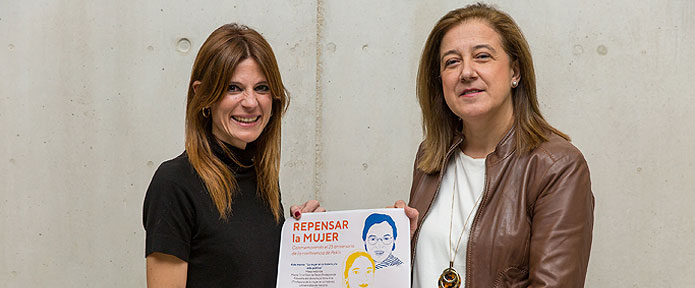"Women are entering public life, it's time for men to conquer the private sphere."
Professors María Cruz Díaz de Terán and Inmaculada Alva reflect on the role of women in history and public life in a series of lectures at the University.

"Women have entered public life, it is time for men to enter private life". This was stated by Professor María Cruz Díaz de Terán during the cycle "Rethinking Women" held at the University of Navarra. The expert in Philosophy of Law spoke of co-responsibility and stressed that traditionally the responsibility of reconciling both lives has been associated only with women, but today "we must talk about how both should reconcile life staff and professional life".
María Cruz Díaz de Terán, together with Inma Alva, professor of Women's History, reflected on the role of women in history and public life in the first lecture of the series. The meeting, promoted by the Student Representation of the University and by resident students of the Alumni College, commemorates the 25th anniversary of the lecture of Beijing and is part of the celebration of International Women's Day.
Feminisms in historyInma Alva emphasized the historical aspect and referred to the consolidation of the theory of the two spheres, private and public, starting in the 19th century. "Although women had been influential at other times in history, in this century they were relegated to the private sphere". Thus, she said, the first wave of feminism concentrated on obtaining women's suffrage: "They were convinced that, once achieved, they would be able to acquire the rest of the rights".
According to her, the division began to grow from the second wave of feminism, which appeared in the 60s, as well as in the 90s and nowadays, when new feminisms are created. "From the historical point of view, it is not possible to speak of a single feminism, but of feminisms: radical feminism, feminism of equality or feminism of difference, ecofeminism, liberal feminism, among others".
María Cruz Díaz de Terán spoke from the legal point of view and pointed out that "the term 'feminism' refers to equality of attention, rights and opportunities" between women and men. "Many times it is often said that if there is already a principle of equality why do we need feminism. But the principle of equality, when it was constituted, was intended only for men. The motto of the French Revolution, 'liberty, equality, fraternity,' excluded women," she explained. For this reason, she continued, it became necessary to create another concept, that of feminism, which did "explicitly" recognize equality between women and men.
The professor referred to women such as Clara Campoamor or Mercedes Formica, who fought for women's rights in Spain, as well as to the "support networks among women or sororities in so many parts of the world that worked to improve women's status ". She also highlighted the importance of successful female role models to awaken the interest of young women in these professions.




